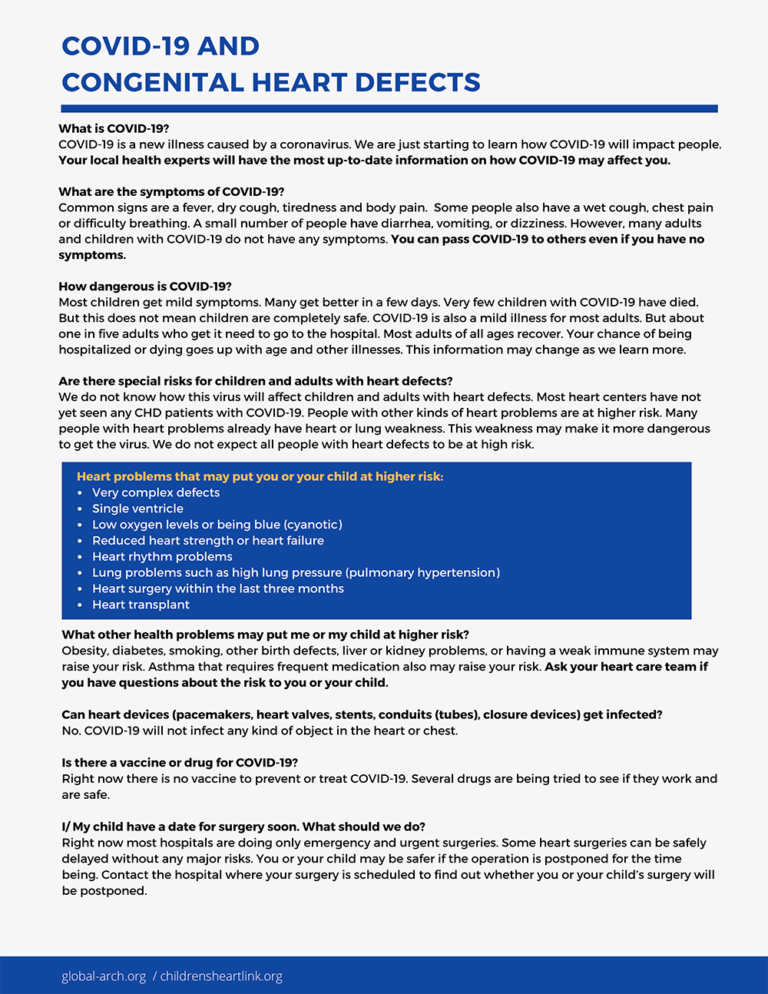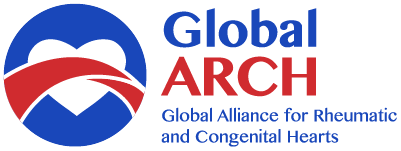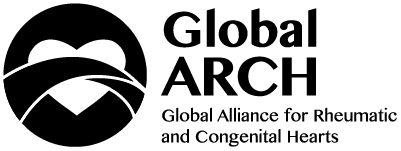CHD and COVID-19

Other languages:
Additional resources
Risk factors for “long haul” COVID in people with rheumatic heart disease identified
A new study by researchers at Hospital for Special Surgery (HSS) in New York City demonstrates over half of patients with rheumatic diseases who contracted COVID-19 during the pandemic and completed a COVID-19 survey, experienced so-called “long-haul” COVID, or prolonged symptoms of the infection, including loss of taste or smell, muscle aches and difficulty concentrating, for one month or longer.
Worse Hospital Outcomes for Children and Adults with COVID‑19 and Congenital Heart Disease, published in Pediatric Cardiology, 2021. This appears to be the first study to report the increased hospital morbidities and costs for patients with congenital heart disease affected by COVID-19.
Risk of rare blood clotting much higher in COVID-19 than for vaccines: Researchers at the University of Oxford report that the risk of rare blood clotting known as cerebral venous thrombosis (CVT) following COVID-19 infection is around 100 times greater than normal, several times higher than it is post-vaccination or following influenza.
COVID-19 in adults with congenital heart disease: a 2021 paper published in the Journal of the American College of Cardiology demonstrating that in congenital heart disease patients COVID-19 death rates are similar to that of the general population. Risk is based on health status and not diagnosis.
Coronavirus disease 2019 in adults with congenital heart disease: a position paper from the ESC working group of adult congenital heart disease, and the International Society for Adult Congenital Heart Disease
Guarding Mental Health During the COVID-19 Pandemic – Rehab 4 Addiction, an online resource to people dealing with substance addiction, has published this educational guide to increase the understanding and awareness of coping with bereavement and the lockdown. With the current coronavirus pandemic, many who live with depression are struggling to stay afloat during mandated or self isolation
How to Properly Wash Your Hands – information and video instructions published by the Certified Nursing Assistants, World Health Organization, and Center for Disease Control
COVID-19 in Congenital Heart Disease: Ten Points to Remember, from the American College of Cardiology, June 2020
Conquering CHD: Covid 2020: Stories of Recovery: Conquering CHD spoke with three members of the congenital heart disease community who contracted and conquered COVID-19 – a youth patient as shared by her mother, an adult patient/medical student, and a pediatric cardiologist.
Tips for people living with congenital heart disease [PDF] [French Version]
Is it COVID-19? [PDF]
Technical Guidance on COVID-19
Research on COVID-19
Journal of the American Heart Association: The Impact of Coronavirus disease 2019 (COVID‐19) on Patients with Congenital Heart Disease across the Lifespan: The Experience of an Academic Congenital Heart Disease Center in New York City
A retrospective review of all individuals with CHD followed at Columbia University Irving Medical Center who were diagnosed with COVID‐19 between March 1 2020 and July 1 2020. The researchers found that the number of symptomatic COVID‐19 patients was relatively low. CHD patients with a genetic syndrome and adults at advanced physiological stage were at highest risk for moderate/severe infection.
Journal of Clinical Medicine: COVID-19 and Congenital Heart Disease: Results From a Nationwide Survey
Conclusions: Despite previous reports pointing to a higher case-fatality rate among patients with cardiovascular co-morbidities, we observed a mild COVID-19 clinical course in our cohort of CHD patients. Although these results should be confirmed in larger cohorts to investigate the underlying mechanisms, the findings of low cardiovascular complications rates and no deaths are reassuring for CHD patients. Link to abstract
BMJ Journals: Adult congenital heart disease and the COVID-19 pandemic
Adults with congenital heart disease (ACHD) may be at high risk in the case of COVID-19. Due to the heterogeneity of ACHD and secondary complications, risk profiles are, however, not uniform. This document aims to give an overview of relevant data and outline our pragmatic approach to disease prevention and management. Based on anatomy and additional physiological factors including symptoms, exercise capacity, heart failure, pulmonary hypertension and cyanosis, we propose a pragmatic approach to categorising patients into low-risk, intermediate-risk and high-risk groups. Link to article
Journal of Clinical Medicine, June 1, 2020 (Italian population): COVID-19 and Congenital Heart Disease: Results from a Nationwide Survey
Conclusions: Despite previous reports pointing to a higher case-fatality rate among patients with cardiovascular co-morbidities, we observed a mild COVID-19 clinical course in our cohort of CHD patients. Although these results should be confirmed in larger cohorts to investigate the underlying mechanisms, the findings of low cardiovascular complications rates and no deaths are reassuring for CHD patients.
Link to article
Journal of the American College of Cardiology: Call For COVID-19 Clinical Cases
Message from the Congenital Heart Public Health Consortium (CHPHC): In an effort to help inform and educate our medical community on improved patient care related to the COVID-19 pandemic, JACC: Case Reports offers a publication avenue to share this knowledge with a fast-tracked review. Front-line providers are encouraged to submit their experience with cases of COVID-19 and cardiovascular involvement to the journal for consideration.
Inform Congenital Heart Disease (InformCHD): Conquering CHD is committed to learning more about how COVID-19 specifically impacts those with congenital heart disease. The InformCHD secure database will collect information directly from people with congenital heart disease. The survey is not live yet. All persons with congenital heart disease (or their caregivers), regardless of their age or type of CHD, will be able to participate. Conquering CHD also offers a weekly COVID-19 Update.
Right ventricle enlargement a major predictor for mortality among COVID patients, new study finds
Enlargement of the right ventricle was the only variable that was significantly associated with mortality in this group of Covid-19 patients, according to the study, which has been accepted for publication in the Journal of the American College of Cardiology. Read more
Kawasaki Disease and Covid-19: FAQs
The current COVID-19 pandemic, emerging reports and alerts from Europe, as well as reports in the news media, have raised a lot of concerns and questions regarding a possible link or association between COVID-19 infection and Kawasaki disease in children. Kawasaki Disease Canada intends to clarify and interpret this information in order to provide patients, families and the general public with useful and practical information that will be updated periodically. Read more
Congenital Heart Disease Public Health Consortium: Information on coronovirus disease (COVID-19) and congenital heart disease
British Heart Foundation: Coronavirus: what it means for you if you have heart or circulatory disease
World Health Organization (WHO): Coronavirus disease (COVID-19) advice for the public: Myth busters
World Health Organization (WHO): Q&A on coronaviruses (COVID-19)
Adult Congenital Heart Association (ACHA): COVID-19 (Coronavirus): What It Means for Adults with Congenital Heart Disease
European Society of Cardiology: COVID-19 and Heart Patients (Q&A)
From the Congenital Heart Public Health Consortium (CHPHC): Through the site HealthyChildren.org, American Academy of Pediatrics offers a collection of articles in response to the evolving COVID-19 pandemic in both English and Spanish. In addition to a main COVID-19 page, COVID-19 Information for Families of Children and Youth with Special Health Care Needs is also available.
The Children’s Heart Foundation: Q&A sessions with Drs John Costello and Jennifer Romano.
Conquering CHD COVID-19 Update – In response to COVID-19, Conquering CHD is providing its community with trusted resources from expert sources. These include: InformCHD
Share this page




